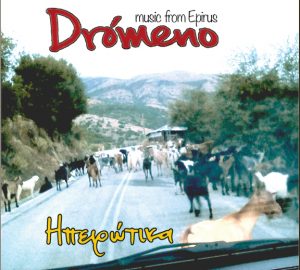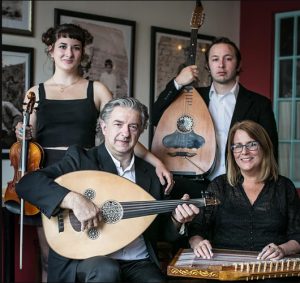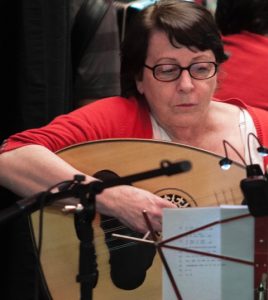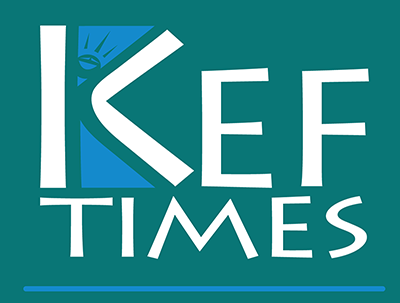Sometimes, by pure se rendipity, you come across a new experience that reaches into your soul. Such an opportunity arises at least once a year at the East European Folklife Center’s Balkan camp in the Mendocino California woodlands, when members of the Drómeno band gather in a woodsy back room off the kitchen on a mid-week afternoon and play music of Epirus, a mountainous region in Western Greece. This rare treat can now be replicated with the release of Dromeno’s long-awaited, newest CD, Music from Epirus.
rendipity, you come across a new experience that reaches into your soul. Such an opportunity arises at least once a year at the East European Folklife Center’s Balkan camp in the Mendocino California woodlands, when members of the Drómeno band gather in a woodsy back room off the kitchen on a mid-week afternoon and play music of Epirus, a mountainous region in Western Greece. This rare treat can now be replicated with the release of Dromeno’s long-awaited, newest CD, Music from Epirus.
The Seattle-based band is led on clarinet by Christos Govetas, whose roots are planted and earliest memories rose up from the soil of Northern Greece’s Serres region. Joined by his talented and versatile, American-born wife, Ruth Hunter, on accordion, it is their singing that provokes an emotion in the polyphonic songs, with what Christos calls a “metallic” vocalization that cuts through any sentimentality in the lyrics.
Eleni Govetas exhibits mastery of the violin and the defi. Non-family member Nick Maroussis enriches the sounds with improvised melodic runs on the laouto and guitar.
Traditional folk music often is a poignant expression of the hardships and suffering of those who sing and play it. Here, for example, in the track 8 polyphonic song “Ksenitemeni Mou Poulia,” the words tell of the loneliness of a man living in a foreign land without his wife and children. We don’t have to understand the Greek lyrics to feel this sorrow because it comes through in Ruth’s voice, singing lead, interwoven with improvised sounds typical of this style emanating from Christos. I’ve become a binge listener of this track.
Such nuanced interpretations are due to Drómeno’s meticulous approach to traditional Epirotiko style, with its gaping glissandi in intervals of a 7th (if you don’t know what these are, listen to the track 6 Beratis) and slippery clarinet slides unique to the music of these remote mountain villages. It is apparent that this mostly family band has internalized the musical nuances of the style and has achieved the daunting feat of becoming exponents of it.
But the question remains, how did a young Greek village boy from the Serres region, where the predominant folk music is played on zournades and daouli and has an entirely different character, become so adept at singing and playing the music of Epirus?
 “When I was a kid in Greece,” explains Christos, “in the hot long summers after we'd bring tobacco we had collected from the fields to the shed where we'd needle it and string it to dry (a copious and tedious work), there was Simon Karas's two hour radio program from 3:00-4:00 in the afternoon with all those incredible recordings, some of which were from Epirus.”
“When I was a kid in Greece,” explains Christos, “in the hot long summers after we'd bring tobacco we had collected from the fields to the shed where we'd needle it and string it to dry (a copious and tedious work), there was Simon Karas's two hour radio program from 3:00-4:00 in the afternoon with all those incredible recordings, some of which were from Epirus.”
And before Ruth came into his life, Christos was briefly engaged to a woman from Epirus.
“We'd go to Greece in the summer and attend every music festival in the region. I never really thought I could play that music but I surely loved it. For a time I listened exclusively to this music, old recordings, new versions, specific players etc. Slowly, I worked on a few tunes and developed vocabulary and repertoire, and played at every opportunity.”
Close listening to such music gave him insights into the physics of its structure, such as the fact that, in a pentatonic (five-notes to the octave) scale common in this region, the five notes can be intermixed and played together in random order without clashing. This allows, for example, the unmetered, improvised solos such as those on the opening track of Music of Epirus, a miroloi, an expression of the sorrow of loss, whether from the passing of a loved one or the self-imposed exile to work abroad.
As an antidote to the melancholy mood, there is also music of celebration and dance. In the high mountain villages of Epirus, villagers often party for days to live music. They dance the Sta Dio throughout the evening to a variety of songs, a few you’ll find here.
Dancers will also discover delightful renditions of lesser-known dances, such as I Perdika, and more challenging dances, including Kleftes and Beratis.
Give your soul a treat.
The CD and further info on the band can be found at
https://www.dromenomusic.com. Also available at cdbaby.com

 Joan Carol Friedberg has been passionate about Greek and Balkan traditional music since she first heard it in the 1970s and has traveled throughout the Balkans and to Greece many times to experience it firsthand. She currently plays laouto with the Los Angeles-based Greek band Sto Horio. She is author of Dancing on the Off Beat: Travels in Greece, published in 2005.
Joan Carol Friedberg has been passionate about Greek and Balkan traditional music since she first heard it in the 1970s and has traveled throughout the Balkans and to Greece many times to experience it firsthand. She currently plays laouto with the Los Angeles-based Greek band Sto Horio. She is author of Dancing on the Off Beat: Travels in Greece, published in 2005.


